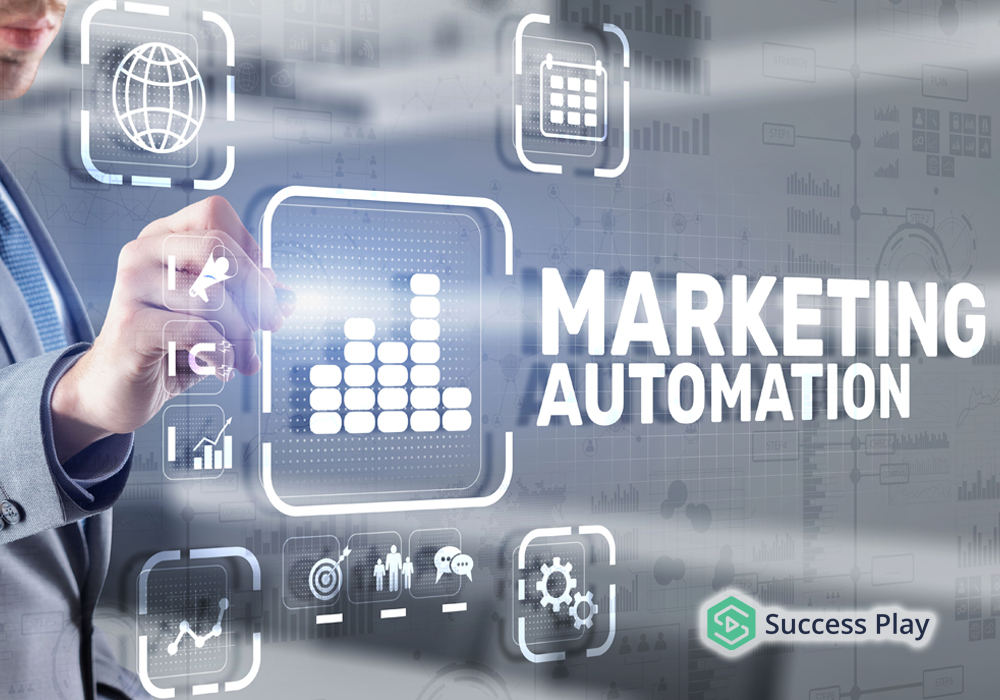
The Power of Marketing Automation in Driving Sales
Marketing automation has revolutionized the way businesses engage with their customers, drive sales, and achieve growth. In today’s digital age, where consumers are bombarded with countless marketing messages, marketing automation provides a powerful solution to cut through the noise and deliver personalized experiences that drive conversions. In this article, we will explore the power of marketing automation and how it can significantly impact your sales efforts.
Introduction
In an increasingly competitive market, businesses need to leverage effective strategies to stay ahead. Marketing automation refers to the use of software platforms and technologies to automate repetitive marketing tasks, streamline processes, and nurture leads throughout the buyer’s journey. By combining data-driven insights and personalized communication, marketing automation empowers businesses to connect with their audience in a targeted and efficient manner.
What is Marketing Automation?
Marketing automation is a comprehensive approach that enables businesses to automate various marketing tasks, such as email campaigns, social media management, lead scoring, and more. It allows companies to nurture leads, segment their audience, and deliver personalized content based on user behavior and preferences. By automating these processes, businesses can save time, reduce manual effort, and focus on creating meaningful connections with their customers.
Benefits of Marketing Automation

Increased Efficiency and Productivity
One of the primary benefits of marketing automation is the significant boost in efficiency and productivity it offers. By automating repetitive tasks, such as email marketing or social media scheduling, businesses can free up valuable time for their marketing teams to focus on more strategic activities. This allows them to optimize their resources and achieve better results in less time.
Personalized Customer Experience
Marketing automation enables businesses to deliver personalized experiences at scale. By leveraging customer data and behavioral insights, businesses can segment their audience and tailor their marketing messages to specific customer groups. This level of personalization helps in building stronger relationships with customers, increasing engagement, and ultimately driving sales.
Lead Generation and Nurturing
Marketing automation plays a crucial role in lead generation and nurturing. By capturing leads through various channels and automating lead nurturing campaigns, businesses can guide prospects through the sales funnel effectively. With personalized content and timely follow-ups, marketing automation ensures that leads are nurtured and moved closer to making a purchase.
Improved Sales Conversion
The power of marketing automation becomes evident when it comes to improving sales conversion rates. By delivering targeted messages and relevant content to prospects at the right time, businesses can increase the likelihood of conversions. Automated lead scoring and nurturing processes help identify high-quality leads and provide sales teams with valuable insights to close deals more effectively.
Enhanced Customer Retention
Marketing automation is not limited to acquiring new customers but also helps in retaining existing ones. By engaging customers with personalized and relevant content, businesses can strengthen their relationships and increase customer loyalty. Automation allows for timely follow-ups, customer satisfaction surveys, and targeted offers, all of which contribute to enhancing customer retention.
Key Features of Marketing Automation
To fully leverage the power of marketing automation, businesses need to utilize the key features offered by automation platforms. Let’s explore some of these features:

Email Marketing Automation
Email marketing automation allows businesses to send targeted emails based on specific triggers or user behavior. Automated emails can be personalized, ensuring that the content resonates with recipients and drives engagement. By automating email campaigns, businesses can nurture leads, promote products or services, and increase customer loyalty.
Lead Scoring and Segmentation
Lead scoring and segmentation enable businesses to categorize leads based on their engagement level and likelihood of conversion. By assigning scores to leads and segmenting them into different categories, businesses can prioritize their efforts and tailor their marketing campaigns accordingly. This ensures that the right messages reach the right audience, maximizing the chances of sales success.
Drip Campaigns
Drip campaigns involve sending a series of pre-written, automated messages to leads or customers over a specific period. These campaigns are designed to provide valuable information, nurture leads, and guide prospects through the buyer’s journey. Drip campaigns help build relationships, establish trust, and increase the chances of converting leads into customers.
Social Media Management
Marketing automation platforms often include social media management tools that allow businesses to schedule and publish posts across multiple social media platforms. Automation simplifies the process of managing social media accounts, ensuring consistent and timely communication with the target audience. By automating social media posting, businesses can maintain an active online presence and engage with their followers effectively.
Analytics and Reporting
Marketing automation platforms provide robust analytics and reporting features, enabling businesses to measure the performance of their marketing campaigns. By tracking metrics such as open rates, click-through rates, and conversion rates, businesses can gain valuable insights into their audience’s behavior and campaign effectiveness. This data-driven approach allows for continuous improvement and optimization of marketing strategies.
Implementing Marketing Automation
Implementing marketing automation requires careful planning and execution. Here are some essential steps to consider:
Define Your Objectives and Strategy
Before implementing marketing automation, businesses need to define their objectives and develop a clear strategy. Identify what you want to achieve with automation, whether it’s lead generation, nurturing, increasing sales, or improving customer retention. Having a well-defined strategy will guide your implementation process and ensure that you make the most of marketing automation.
Select the Right Marketing Automation Platform
Choosing the right marketing automation platform is crucial to the success of your automation efforts. Consider factors such as features, ease of use, integration capabilities, scalability, and pricing. Evaluate different platforms, read reviews, and select the one that best aligns with your business requirements and budget.
Data Integration and Management
To effectively leverage marketing automation, businesses need to ensure proper integration and management of their data. Connect your automation platform with your customer relationship management (CRM) system and other relevant tools to centralize your data. Cleanse and segment your data to create targeted campaigns and personalized experiences.
Creating Targeted Campaigns
With marketing automation, you can create targeted campaigns tailored to specific segments of your audience. Leverage the data and insights available to craft personalized messages that resonate with your recipients. Develop a content strategy that aligns with your automation goals and create engaging content to nurture leads and drive conversions.
Testing and Optimization
Continuous testing and optimization are essential for maximizing the effectiveness of your marketing automation efforts. A/B testing different campaign elements, analyzing results, and making data-driven adjustments will help you refine your automation workflows and achieve better outcomes over time.
Overcoming Challenges in Marketing Automation
While marketing automation offers numerous benefits, there are challenges that businesses may encounter. Here are some common challenges and ways to overcome them:
Lack of Proper Data
To make the most of marketing automation, businesses need access to quality data. Ensure that your data is accurate, up-to-date, and properly segmented. Regularly clean and update your database to improve campaign targeting and increase the accuracy of lead scoring.
Training and Skill Development
Implementing marketing automation may require training your marketing team or hiring specialists familiar with automation platforms. Invest in training programs to ensure your team understands the platform’s capabilities and can effectively utilize its features. Continuous skill development will empower your team to leverage automation to its fullest potential.
Integration with Existing Systems
Integrating marketing automation with existing systems, such as CRM platforms or content management systems, can be a challenge. Work closely with your IT team or consultants to ensure smooth integration and data synchronization between systems. This will enable seamless automation workflows and a unified view of customer data.
Balancing Automation with Personalization
While automation provides efficiency and scalability, it’s crucial to strike the right balance between automation and personalization. Avoid generic or impersonal messages by utilizing the data at hand to create targeted and personalized content. Maintain a human touch in your communication to build authentic connections with your audience.
Real-Life Examples of Successful Marketing Automation
To illustrate the power of marketing automation, here are a few real-life examples of businesses that have achieved success through automation:
- Company XYZ used marketing automation to increase their email open rates by 30% by sending personalized product recommendations based on customer preferences and previous purchases.
- E-commerce store ABC implemented marketing automation to streamline their abandoned cart recovery process. By sending automated follow-up emails with special offers and reminders, they successfully recovered 20% of abandoned carts and increased their overall sales.
- Service provider XYZ leveraged marketing automation to nurture leads and guide them through their sales funnel. By implementing targeted drip campaigns based on customer interests and behaviors, they achieved a 50% increase in conversion rates.
These examples demonstrate how marketing automation can drive sales, enhance customer engagement, and improve overall business performance.
Conclusion
Marketing automation has become an indispensable tool for businesses seeking to drive sales and achieve growth in today’s competitive landscape. By automating repetitive tasks, personalizing customer experiences, and nurturing leads, businesses can significantly impact their sales efforts. Implementing marketing automation requires careful planning, data management, and continuous optimization to unlock its full potential. By leveraging the power of marketing automation, businesses can engage with their audience in a more targeted and efficient manner, ultimately driving sales and fostering long-term customer relationships
FAQs
1. What is marketing automation?
Marketing automation refers to the use of software platforms and technologies to automate repetitive marketing tasks and streamline processes, enabling businesses to deliver personalized experiences and drive sales.
2. How does marketing automation benefit businesses?
Marketing automation offers benefits such as increased efficiency and productivity, personalized customer experiences, lead generation and nurturing, improved sales conversion rates, and enhanced customer retention.
3. What are some key features of marketing automation?
Key features of marketing automation include email marketing automation, lead scoring and segmentation, drip campaigns, social media management, and analytics and reporting.
4. How can businesses implement marketing automation effectively?
To implement marketing automation effectively, businesses should define their objectives and strategy, select the right automation platform, integrate and manage their data, create targeted campaigns, and continuously test and optimize their workflows.
5. What are some challenges in marketing automation?
Common challenges in marketing automation include lack of proper data, training and skill development, integration with existing systems, and balancing automation with personalization.
Join today and start experiencing the benefits.
Join our customer engagement platform and take your customer relationships to the next level with personalized interactions, valuable insights, and exceptional experiences that will keep your customer coming back for more.


